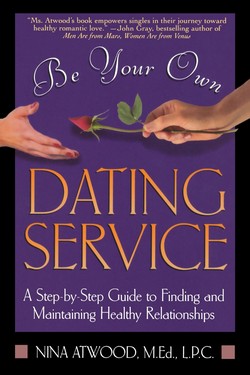My Relationship Isn’t Working: Who’s To Blame?
By Nina Atwood
 Hundreds of men and women have asked me this question in one form or another over the years, and my standard answer is this: in every case, two people carry the responsibility for the relationship. “But to what degree?,” they ask. My answer: each person is 100% responsibile for the results of the relationship.
Hundreds of men and women have asked me this question in one form or another over the years, and my standard answer is this: in every case, two people carry the responsibility for the relationship. “But to what degree?,” they ask. My answer: each person is 100% responsibile for the results of the relationship.
“But how can that be?” people wail. In the midst of conflict, when you’re emotionally triggered, it feels like you are the wronged one, that the other person is inflicting all the pain. Later, however, when no longer triggered, deep down you know that you contributed to the problem, either through provoking the other person, stonewalling, defensiveness, disconnecting and shutting down, or something else. On this deeper level, minus the defensiveness, it is easier to see that drama in relationships can’t happen without two participants.
If we could slow down time and take snapshots along the way, we would see that in relationships that are troubled there is an escalation of emotion to which both parties contribute. One person inadvertently steps on the other person’s emotional toes. The other person has a choice: to engage from a triggered emotional state, or to take the time to cool off before responding. The moment of choice may be a split second, sometimes too short to register consciously. This is why it is so important to work at raising your level of consciousness and self-awareness. With greater consciousness the gain is a longer moment of choice and thus better choices.
This is why you hear it said that some people have a “short fuse.” A person with a short fuse has almost no self-awareness and tends to view their anger as a function of other people’s behavior; i.e., “they made me angry.”
Are you in a relationship with a short-fuse person? If so, you may feel that you are the victim of that person’s lack of consciousness and therefore not responsible for the dismal state of the relationship. Yet even in this case, you have the choice of contributing to the problem or contributing to the solution.
From your own position of self-awareness, you have the power to acknowledge the impact of your lover’s behavior and to share it in the spirit of contribution. You can make requests for behavior change. You can provide consequences for unacceptable behavior; i.e., “if you begin yelling I will leave so that we can both cool off.” You can do all of this with gentle straight-talk minus an emotionally triggered state of your own. And finally, you have the power to leave the relationship if the other person refuses to enage in solutions with you.
Is this easy? Absolutely not! But the reward is a healthy, functional relationship that has an opportunity to thrive. If the other person isn’t ready to grow with you, and you’ve truly done your best over a period of time, your reward is knowing that you did your best before you moved on.
Entry Filed under: Dating,Relationships





